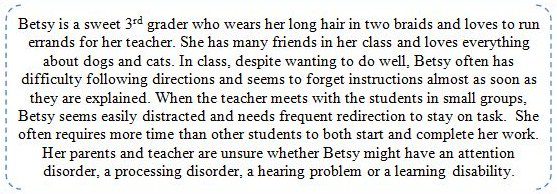Parents, teachers and doctors often make reference to a child having a “Processing Disorder.” This is an elusive term with an almost infinite number of possible meanings. This article will primarily deal with processing problems in children; however, it is important to note that many adults continue to struggle with the same issues and may identify with the examples discussed.
Discovering the meaning of “Processing Disorder”
The term “processing” simply refers to how information is dealt with in the brain. Information, whether it comes in through our eyes, ears, nose or fingertips, must first be received through one of our senses. The next task for our brains is to do something with that information. If it gets stored for the long term, which can range from about 15 minutes to years, we need an appropriate way to catalog and retain the information so that we can retrieve it at a later time. A “processing disorder” can then mean there is a breakdown somewhere in this system whereby information is not effectively processed or retained.

There is no official disorder in any diagnostic manual called “Processing Disorder” and there is limited consensus across professional disciplines about whether such a thing even exists. However, many health professionals relate back to the umbrella term of “Processing Disorder” by simply using different names for a diagnosis. For example, occupational therapists have built careers around helping children with Sensory Integration Disorder, which is essentially a problem with too much or too little sensitivity to sensory input or difficulty processing information using the senses. What this looks like:
- A girl who is highly sensitive to certain fabrics touching her skin
- A child who detests walking in sand or touching sticky things
- An otherwise healthy boy who has trouble tolerating loud noises
Another example involves difficulty processing information that they hear. With this type of processing problem, an individual might have difficulty paying attention when there is noise in the background or when asked to listen for an extended period of time or retain multiple pieces of information.
An audiologist would diagnose these problems as falling under the heading of Auditory Processing Disorder or Central Auditory Processing Disorder. A speech/language pathologist might see some of these problems as falling under the heading of a Receptive Language Disorder. A psychologist or psychiatrist might indicate that the child has ADD or ADHD. Five possible diagnoses for one issue…that’s crazy!
How to identify “Processing Disorder”
With so many options on how to identify a “Processing Disorder”, it can be difficult to understand its many facets. Here is one model, adapted from the Woodcock-Johnson Tests of Cognitive Abilities, which breaks down processing and memory problems into specific areas of cognitive (thinking) abilities. Each of these areas should be reviewed in a good psychoeducational evaluation or assessment performed by a licensed psychologist. Individuals can have strengths, weaknesses or average functioning in any or all of these areas, which psychology professionals can analyze to identify individual needs. These cognitive domains include:
Processing |
|
Memory |
|
Attention and Executive Functioning |
|
How can we help?
While “Processing Disorder” is not considered an official diagnosis, it does exist as a way to identify cognitive problems. At Rice Psychology Group, after gathering a thorough history and obtaining information from school (if appropriate), we examine reading, writing, math and oral language skills. We additionally look at attention, self-control and memory. Beyond that, we assess how quickly a person can perform simple paper and pencil tasks, manage visual information such as shapes and puzzles, as well as answer oral questions.
Our Tampa-based staff takes the necessary steps to evaluate social, emotional and executive functioning. Finally, we interpret the results and provide the information to parents, the person being assessed and to teachers and other professionals as requested. Explaining the results to patients or clients is one of the most important aspects of this process. Understanding oneself is critical to change and growth and can also dispel many misconceptions. If you have any questions, or if you’re looking for more information, get in touch with any of our Tampa psychologists today.

